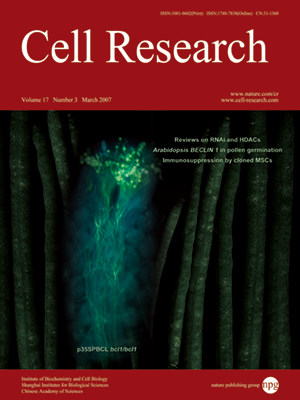
Volume 17, No 3, Mar 2007
ISSN: 1001-0602
EISSN: 1748-7838 2018
impact factor 17.848*
(Clarivate Analytics, 2019)
Volume 17 Issue 3, March 2007: 240-248
ORIGINAL ARTICLES
Immunosuppressive properties of cloned bone marrow mesenchymal stem cells
Guangwu Xu1,*, Liying Zhang1,*, Guangwen Ren1,*, Zengrong Yuan1, Yingyu Zhang1, Robert C Zhao1 and Yufang Shi1
1Department of Molecular Genetics, Microbiology and Immunology, Robert Wood Johnson Medical School-University of Medicine and Dentistry of New Jersey, 661 Hoes Lane, Piscataway, NJ 08854, USA
Correspondence: Yufang Shi(shiyu@umdnj.edu)
Mesenchymal stem cells (MSCs), derived from adult tissues, are multipotent progenitor cells, which hold great promise for regenerative medicine. Recent studies have shown that MSCs are immunosuppressive in vivo and in vitro in both animals and humans. However, the mechanisms that govern these immune modulatory functions of MSCs remain largely elusive. Some studies with bulk populations of MSCs indicated that soluble factors such as PGE2 and TGFβ are important, while others support a role for cell-cell contact. In this study, we intended to clarify these issues by examining immunosuppressive effects of cloned MSCs. We derived MSC clones from mouse bone marrow and showed that the majority of these clones were able to differentiate into adipocytes and osteoblast-like cells. Importantly, cells from these clones exhibited strong inhibitory effects on TCR activation-induced T cell proliferation in vitro, and injection of a small number of these cells promoted the survival of allogeneic skin grafts in mice. Conditioned medium from MSC cultures showed some inhibitory effect on anti-CD3 induced lymphocyte proliferation independent of PGE2 and TGFβ. In comparison, direct co-culture of MSCs with stimulated lymphocytes resulted in much stronger immunosuppressive effect. Interestingly, the suppression was bi-directional, as MSC proliferation was also reduced in the presence of lymphocytes. Taking together, our findings with cloned MSCs demonstrate that these cells exert their immunosuppressive effects through both soluble factor(s) and cell-cell contact, and that lymphocytes and MSCs are mutually inhibitory on their respective proliferation.
Cell Research (2007) 17: 240-248. doi: 10.1038/cr.2007.4; published online 27 February 2007
FULL TEXT | PDF
Browse 1948


